哈佛大学校长Drew Faust在2012毕业典礼上的演讲
哈佛校长毕业典礼演讲
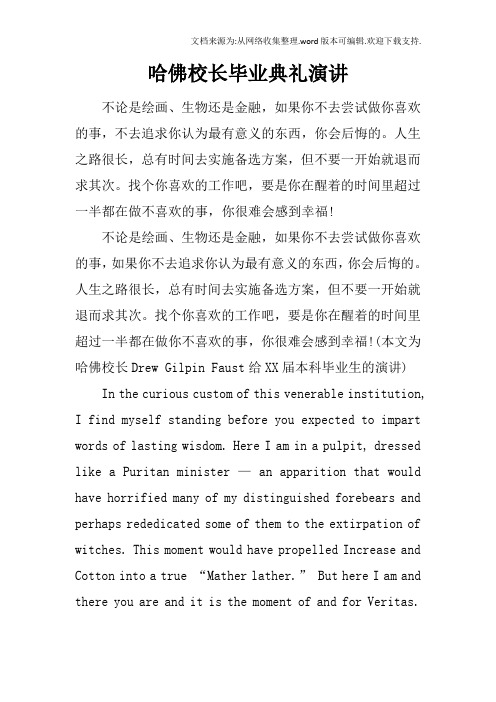
哈佛校长毕业典礼演讲不论是绘画、生物还是金融,如果你不去尝试做你喜欢的事,不去追求你认为最有意义的东西,你会后悔的。
人生之路很长,总有时间去实施备选方案,但不要一开始就退而求其次。
找个你喜欢的工作吧,要是你在醒着的时间里超过一半都在做不喜欢的事,你很难会感到幸福!不论是绘画、生物还是金融,如果你不去尝试做你喜欢的事,如果你不去追求你认为最有意义的东西,你会后悔的。
人生之路很长,总有时间去实施备选方案,但不要一开始就退而求其次。
找个你喜欢的工作吧,要是你在醒着的时间里超过一半都在做你不喜欢的事,你很难会感到幸福!(本文为哈佛校长Drew Gilpin Faust给XX届本科毕业生的演讲) In the curious custom of this venerable institution, I find myself standing before you expected to impart words of lasting wisdom. Here I am in a pulpit, dressed like a Puritan minister — an apparition that would have horrified many of my distinguished forebears and perhaps rededicated some of them to the extirpation of witches. This moment would have propelled Increase and Cotton into a true “Mather lather.” But here I am and there you are and it is the moment of and for Veritas.这所备受尊崇的学校历来好学求知,所以你们期待我的演讲能传授永恒的智慧。
哈佛大学校长德鲁·福斯特在哈佛大学毕业典礼英语演讲稿

哈佛大学校长德鲁·福斯特在哈佛大学毕业典礼英语演讲稿(最新版)编制人:__________________审核人:__________________审批人:__________________编制单位:__________________编制时间:____年____月____日序言下载提示:该文档是本店铺精心编制而成的,希望大家下载后,能够帮助大家解决实际问题。
文档下载后可定制修改,请根据实际需要进行调整和使用,谢谢!并且,本店铺为大家提供各种类型的经典范文,如演讲稿、祝福语、主持词、欢迎词、自我介绍、合同协议、条据书信、报告总结、工作计划、作文大全、其他范文等等,想了解不同范文格式和写法,敬请关注!Download tips: This document is carefully compiled by this editor.I hope that after you download it, it can help you solve practical problems. The document can be customized and modified after downloading, please adjust and use it according to actual needs, thank you!In addition, this shop provides you with various types of classic sample essays, such as speech drafts, blessings, host speech, welcome speech, self-introduction, contract agreement, letter of agreement, report summary, work plan, essay encyclopedia, other sample essays, etc. Want to know the format and writing of different sample essays, so staytuned!哈佛大学校长德鲁·福斯特在哈佛大学毕业典礼英语演讲稿Thank you all and good afternoon alumni, graduates, families, friends, honored guests. For seven years now, it has been my assignment and my privilege to deliver an annual report to our alumni, and to serve as the warm-up act for our distinguished speaker.Whether this is your first opportunity to be a part of these exercises or your fiftieth, it is worthtaking a minute to soak in this place—its sheltering trees, its familiar buildings, its enduringvoices. In 1936, this part of Harvard’s yard was named Tercentenary Theatre, in recognition ofHarvard’s three hundredth birthday. It is a place where giants have stood, and history has beenmade.We were reminded this morning of George Washington’s adventures here. And from this stagein 1943, Winston Churchill addressed an overflow crowd that included 6,000 uniformedHarvard students heading off to war. He said he hoped the young recruits would come toregard the British soldiers and sailors they would soon fight alongside as their “brothers inarms,” and he assured the audience that “we shall never tire,nor weaken, but march withyou … to establish the reign of justice and of law.”Four years later, from this same place, George Marshall introduced a plan that aidedreconstruction across war-stricken Europe, and ended his speech by asking: “What is needed?What can best be done? What must be done?”Here, in 1998, Nelson Mandela addressed an audience of 25,000 and spoke of our sharedfuture. “The greatest single challenge facing our globalized world,” he said, “is to combat anderadicate its disparities.” Ellen Johnson Sirleaf, the first female head of state in Africa, stoodhere 13 years later and encouraged graduates to resist cynicism and to be fearless.Here, on the terrible afternoon of September 11, 20XX, we gathered under a cloudless sky toshare our sadness, our horror, and our disbelief.And here, just three years ago, we marked Harvard’s 375th anniversary dancing in the mud of atorrential downpour. Here, President Franklin Delano Roosevelt had celebrated Harvard’s threecenturies of accomplishment in a comparably soaking rain.Here, J.K. Rowling encouraged graduates to “think themselves into other people’s places.” AndConan O’Brien told them that “every failure was freeing.”Here, honorary degrees have been presented to Carl Jung and Jean Piaget, Ellsworth Kelly andGeorgia O’Keefe, Helen Keller and Martha Graham, Ravi Shankar and Leonard Bernstein, JoanDidion and Philip Roth, Eric Kandel and Elizabeth Blackburn, Bill Gates and Tim Berners-Lee.I remember feeling awed by that history when I spoke here at my installation as Harvard’s28th president, and when I reflected on what has always seemed to me the essence of auniversity: that among society’s institutions, it is uniquely accountable to the past and to thefuture.Our accountability to the past is all around us: Behind me stands Memorial Church, amonument to Harvardians who gave their lives at the Somme and Ypres and Verdun duringWorld War One. Dedicated on Armistice Day in 1932, it represents Harvard’s long tradition ofcommitment to service.In front of me is Widener Library, a gift from a bereaved mother, named in honor of her sonHarry, who perished aboard the Titanic. A library built to advance the learning and discoveryenabled by one of the most diverse and broad collections in the world. Widener’s twelvemajestic columns safeguard texts and manuscripts—some centuries old—that are deployedevery day by scholars to help us interpret—andreinterpret—the past.But this afternoon I would like to spend a few minutes considering our accountability to thefuture, because these obligations must be “our compass to steer by,” our common purpose andour shared commitment.What does Harvard—what do universities—owe the future?First, we owe the world answers.Discovery is at the heart of what universities do. Universities engage faculty and studentsacross a range of disciplines in seeking solutions to problems that may have seemedunsolvable, endeavoring to answer questions that threaten to elude us. The scientific researchundertaken today at Harvard, and tomorrow by the students we educate, has a capacity toimprove human lives in ways virtually unimaginable even a generation ago. In this past yearalone, Harvard researchers have solved riddles related to the treatment of Alzheimer’s, thecost-effective production of malaria vaccine, and the origins of the universe. Harvardresearchers have proposed answers to challenges as varied as nuclear proliferation, Americancompetitiveness, and governance of the Internet.We must continue to support our answer-seekers, who workat the crossroads of thetheoretical and the applied, at the nexus of research, public policy, and entrepreneurship.Together, they will shape our future and enhance our understanding of the world.Second, we owe the world questions.Just as questions yield answers, answers yield questions. Human beings may long forcertainty, but, as Oliver Wendell Holmes put it, “certainty generally is illusion, and repose isnot the destiny of man.” Universities produce knowledge. They must also produce doubt. Thepursuit of truth is restless. We search for answers not by following prescribed paths, but byfinding the right questions—by answering one question with another question, by nurturing astate of mind that is flexible and alert, dissatisfied and imaginative. It is what universitiesare designed to do. In an essay in Harvard Magazine, one of today’s graduates, CheroneDuggan, wrote about seeking what she called “an education of questions.”I hope we haveindeed given her that.Questions are the foundation for progress—for ensuring that the world transcends where weare now, what we know now.And questions are also the foundation for a third obligation that we as universities owe thefuture: we owe thefuture meaning.Universities must nurture the ability to interpret, to make critical judgments, to dare to askthe biggest questions, the ones that reach well beyond the immediate and the instrumental.We must stimulate the appetite for curiosity.We find many of these questions in the humanities: What is good? What is just? How do weknow what is true? But we find them in the sciences as well. Can there be any question moreprofound, more fundamental than to ask about the origins of the universe? How did we gethere?Questions like these can be unsettling, and they can make universities unsettling places. Butthat too is an essential part of what we owe the future—the promise to combatcomplacency, to challenge the present in order to prepare for what is to come. To shape thepresent in service of an uncertain and yet impatient future.We owe the future answers. We owe the future questions. We owe the future meaning. TheHarvard Campaign, launched last September, will help us fulfill these obligations, and pay ourdebt to the future, just as the gifts of previous generations anchor us here today.As today’s ceremonies so powerfully remind us, we also owethe future the men and women whoare prepared to ask questions and seek answers and search for meaning for decades to come.Today we send some 6,500 graduates into the world, to be teachers and lawyers, scientists andphysicians, poets and planners and public servants, and—as our speaker this morning remindedus—to be in their own ways revolutionaries. Ready to take on everything from water scarcity tovirtual currency to community policing. We must continue to invest in financial aid to attractand support the talented students who can build our future, and also we must invest insupporting the teaching and learning that ensures the fullest development of their capacities ina rapidly changing world.If we fulfill our obligation, today’s graduates will have found the “education of questions”Cherone described, a place where, as she put it, “ceilings are only made of sky.” But look aroundyou: we are there. This space is a “theatre” without walls, without a roof, and without limits. Itis a place where extraordinary individuals have preceded us, a place that must encourage ourgraduates—of today and all the years past—to emulate those women and men, to look skywardand to soar.Thank you very much.。
哈佛大学校长德鲁福斯特毕业演讲稿
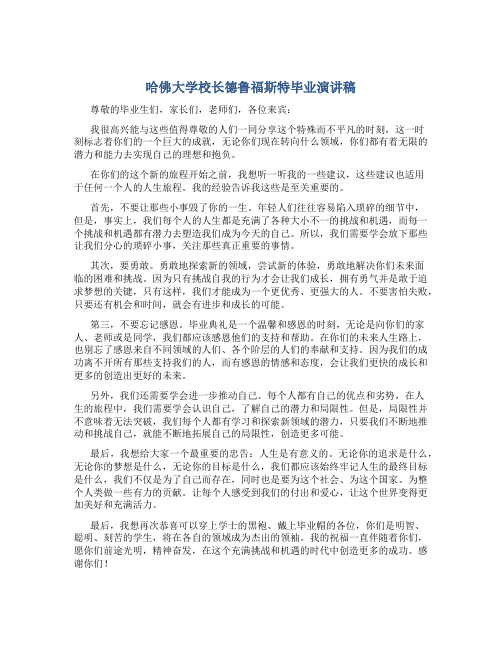
哈佛大学校长德鲁福斯特毕业演讲稿尊敬的毕业生们,家长们,老师们,各位来宾:我很高兴能与这些值得尊敬的人们一同分享这个特殊而不平凡的时刻,这一时刻标志着你们的一个巨大的成就,无论你们现在转向什么领域,你们都有着无限的潜力和能力去实现自己的理想和抱负。
在你们的这个新的旅程开始之前,我想听一听我的一些建议,这些建议也适用于任何一个人的人生旅程。
我的经验告诉我这些是至关重要的。
首先,不要让那些小事毁了你的一生。
年轻人们往往容易陷入琐碎的细节中,但是,事实上,我们每个人的人生都是充满了各种大小不一的挑战和机遇,而每一个挑战和机遇都有潜力去塑造我们成为今天的自己。
所以,我们需要学会放下那些让我们分心的琐碎小事,关注那些真正重要的事情。
其次,要勇敢。
勇敢地探索新的领域,尝试新的体验,勇敢地解决你们未来面临的困难和挑战。
因为只有挑战自我的行为才会让我们成长,拥有勇气并是敢于追求梦想的关键,只有这样,我们才能成为一个更优秀、更强大的人。
不要害怕失败,只要还有机会和时间,就会有进步和成长的可能。
第三,不要忘记感恩。
毕业典礼是一个温馨和感恩的时刻,无论是向你们的家人、老师或是同学,我们都应该感恩他们的支持和帮助。
在你们的未来人生路上,也别忘了感恩来自不同领域的人们、各个阶层的人们的奉献和支持。
因为我们的成功离不开所有那些支持我们的人,而有感恩的情感和态度,会让我们更快的成长和更多的创造出更好的未来。
另外,我们还需要学会进一步推动自己。
每个人都有自己的优点和劣势,在人生的旅程中,我们需要学会认识自己,了解自己的潜力和局限性。
但是,局限性并不意味着无法突破,我们每个人都有学习和探索新领域的潜力,只要我们不断地推动和挑战自己,就能不断地拓展自己的局限性,创造更多可能。
最后,我想给大家一个最重要的忠告:人生是有意义的。
无论你的追求是什么,无论你的梦想是什么,无论你的目标是什么,我们都应该始终牢记人生的最终目标是什么,我们不仅是为了自己而存在,同时也是要为这个社会、为这个国家、为整个人类做一些有力的贡献。
比尔·盖茨在哈佛大学毕业典礼上的演讲(中英文对照)

比尔·盖茨在哈佛大学毕业典礼上的演讲President Bok, former President Rudenstine, incoming President Faust, members of the Harvard Corporation and the Board of Overseers, members of the faculty, parents, and especially, the graduates:尊敬的Bok校长,Rudenstine前校长,即将上任的Faust校长,哈佛集团的各位成员,监管理事会的各位理事,各位老师,各位家长,各位同学:I've been waiting more than 30 years to say this: "Dad, I always told you I'd come back and get my degree."有一句话我等了三十年,现在终于可以说了:“老爸,我总是跟你说,我会回来拿到我的学位的!”I want to thank Harvard for this timely honor. I'll be changing my job next year … and it will be nice to finally have a college degree on my resume.我要感谢哈佛大学在这个时候给我这个荣誉。
明年,我就要换工作了(注:指从微软公司退休)……我终于可以在简历上写我有一个本科学位,这真是不错啊。
I applaud the graduates today for taking a much more direct route to your degrees. For my part, I'm just happy that the Crimson has called me "Harvard's most successful dropout." I guess that makes me valedictorian of my own special class … I did the best of everyone who failed.我为今天在座的各位同学感到高兴,你们拿到学位可比我简单多了。
哈佛大学校长的告别演讲(中英对照)
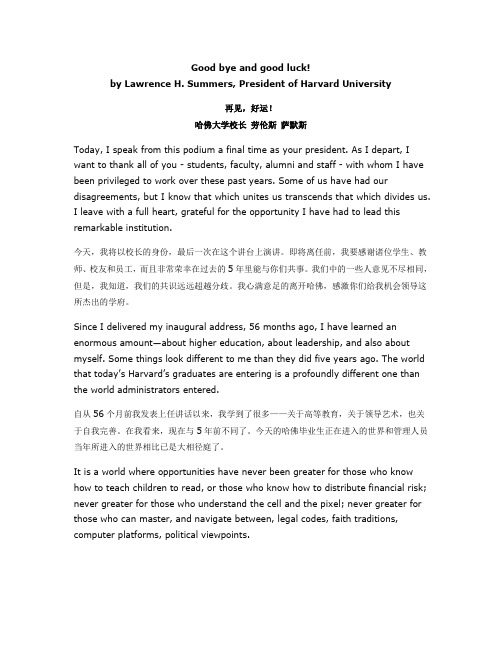
Good bye and good luck!by Lawrence H. Summers, President of Harvard University再见,好运!哈佛大学校长劳伦斯萨默斯Today, I speak from this podium a final time as your president. As I depart, I want to thank all of you - students, faculty, alumni and staff - with whom I have been privileged to work over these past years. Some of us have had our disagreements, but I know that which unites us transcends that which divides us.I leave with a full heart, grateful for the opportunity I have had to lead this remarkable institution.今天,我将以校长的身份,最后一次在这个讲台上演讲。
即将离任前,我要感谢诸位学生、教师、校友和员工,而且非常荣幸在过去的5年里能与你们共事。
我们中的一些人意见不尽相同,但是,我知道,我们的共识远远超越分歧。
我心满意足的离开哈佛,感激你们给我机会领导这所杰出的学府。
Since I delivered my inaugural address, 56 months ago, I have learned an enormous amount—about higher education, about leadership, and also about myself. Some things look different to me than they did five years ago. The world that today’s Harvard’s graduates are entering is a profoundly different one than the world administrators entered.自从56个月前我发表上任讲话以来,我学到了很多——关于高等教育,关于领导艺术,也关于自我完善。
哈佛大学毕业典礼校长演讲稿
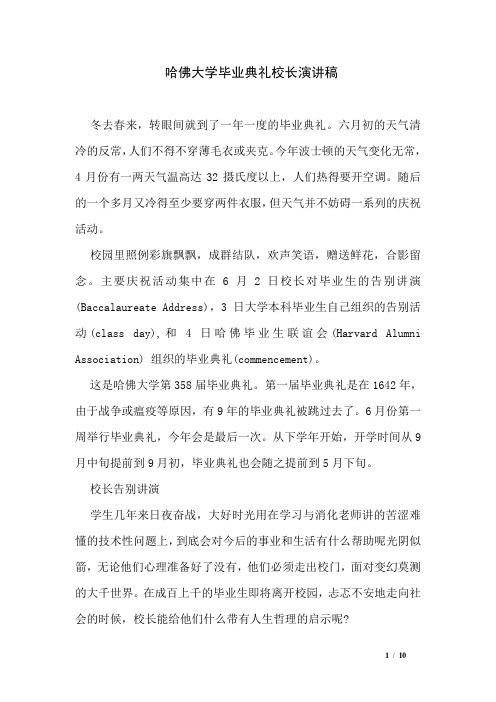
哈佛大学毕业典礼校长演讲稿冬去春来,转眼间就到了一年一度的毕业典礼。
六月初的天气清冷的反常,人们不得不穿薄毛衣或夹克。
今年波士顿的天气变化无常,4月份有一两天气温高达32摄氏度以上,人们热得要开空调。
随后的一个多月又冷得至少要穿两件衣服,但天气并不妨碍一系列的庆祝活动。
校园里照例彩旗飘飘,成群结队,欢声笑语,赠送鲜花,合影留念。
主要庆祝活动集中在6月2日校长对毕业生的告别讲演(Baccalaureate Address),3日大学本科毕业生自己组织的告别活动(class day),和4日哈佛毕业生联谊会(Harvard Alumni Association) 组织的毕业典礼(commencement)。
这是哈佛大学第358届毕业典礼。
第一届毕业典礼是在1642年,由于战争或瘟疫等原因,有9年的毕业典礼被跳过去了。
6月份第一周举行毕业典礼,今年会是最后一次。
从下学年开始,开学时间从9月中旬提前到9月初,毕业典礼也会随之提前到5月下旬。
校长告别讲演学生几年来日夜奋战,大好时光用在学习与消化老师讲的苦涩难懂的技术性问题上,到底会对今后的事业和生活有什么帮助呢光阴似箭,无论他们心理准备好了没有,他们必须走出校门,面对变幻莫测的大千世界。
在成百上千的毕业生即将离开校园,忐忑不安地走向社会的时候,校长能给他们什么带有人生哲理的启示呢?6月2日下午的校长告别讲演照例在校园中心的纪念教堂(Memorial Church)举行。
虽然是大庭广众之下的书面发言,但并不完全是冠冕堂皇的做秀,其中不乏肺腑之言。
校长福斯特(Drew Gilpin Faust)首先回忆了这批毕业生在过去四年的经历。
她说,你们进入校园时正好是卡特里亚娜(Katrina)台风肆虐的时候,你们离开校园时正好是经济风暴席卷全球,改变这个国家和世界的时候。
你们也目睹了哈佛的变化。
你们在四年中经历了三位校长(萨默斯,代校长巴克( Derek Bok),和福斯特本人),你们经历了旧的教学大纲(Core Curriculum)的退出和新的教学大纲的引入(General Education),和一些校舍的变化。
哈佛大学校长在毕业典礼上的讲话

哈佛大学校长在毕业典礼上的讲话哈佛大学校长在毕业典礼上的讲话哈佛的校长福斯特(Drew Faust)上任刚刚一年,也是哈佛历史上第一任女校长。
她今年的讲演集中解释一个现象:很多哈佛毕业生都问她:为什么大约一半的哈佛本科毕业生去华尔街投资银行或名牌咨询公司工作?福斯特没有正面回答,转而思考学生为什么会问这个问题。
“丰厚的薪水和待遇无疑是吸引年轻人的一个重要原因,但如果你们很满意自己的选择的话,为什么还会问我这个问题呢?”她认识到,有些学生在选择投资银行或咨询公司时是被迫的,他们觉得不这样选择不行。
“你们其实在问我生活的意义,什么样的生活是幸福的生活?那么让我们放下外表的伪装,回到这个问题最初的起因。
”福斯特说,“我想你们在担心传统上看起来‘成功’的生活和你们心里认为有意义的生活经常是不一致的。
你们在想,如何把这两个目标在下一步选择工作或研究生深造的过程中统一起来。
你们发现这两个目标不能统一,所以你们会困惑会提问。
”哈佛女校长的毕业演讲,是从学生个人的角度出发,回答一个时代的难题:即个人自由与世俗力量的矛盾中,个人应该如何选择。
精英群体的选择,往往决定一个时代的整体风气。
对哈佛毕业生普遍面临的困惑,她的建议是:“做你热爱的工作吧。
如果你一半以上清醒的时间都在做你不热爱的工作,就很难有幸福可言。
”她的答案实际是,服从本心与心灵的自由。
这让我想起北大一老校长,胡适的名言“争你们个人的自由就是争国家的自由。
”和胡适一样留学美国的林毅夫老师,也是我极为尊重的一位老师,一具有知识分子操守与情怀的人。
他在CCER2008毕业典礼上的演说里,没有从个人自由的角度,而是从个人对国家责任的角度,来谈北大学生的选择。
在眼说中,林老师高举了理想和道德的旗帜,可是,他所关注的是理想状态的“应然”,是我们个人对国家的责任。
他说“走出北大校园迎接我们的世界又是怎样的,我们应该以怎样的心态走出北大校门。
”他说:“在北大读书,不是为了追求个人名利,而是希望在北大读书期间充实自己,为国家,为民族的复兴,为人类美好的未来做出贡献。
Faust毕业典礼致辞哈佛大学校长Drew

Faust毕业典礼致辞哈佛大学校长Drew 哈佛大学Drew Faust:最好的教育即培养精神习惯Faust于Memorial Church向身着方帽长袍的毕业生发表了一年一度的毕业班告别讲话。
一年一度的毕业仪式在毕业典礼之前举行,包括祈祷、唱诗及校长为毕业班进行的告别演讲。
“牢记正是通艺教育为各位应对变革做好了准备,”Faust说。
“更新我们的承诺并重新规划人生的机会是一项仅供少数几代人拥有的特权。
而现时它不是一种可能,而是一种必要。
”这一几乎与哈佛大学同样古老的仪式可以追溯到1642年。
当年的举行的第一次仪式使哈佛的工作人员及神职人员有机会在更安格按照流程进行的毕业典礼之前向毕业生发表讲话。
这一仪式由基督教道德Plummer 讲席教授及Memorial Church蒲塞牧师Rev. Peter J. Gomes主持,主要以儒学、伊斯兰教、印度教、犹太教及基督教读物为特色。
Faust的讲话是仪式的中心亮点。
她称哈佛大学强调通艺教育正是为了这样的危机时刻设计的。
第一,不管今后学习、生活在何方,都要志存高远,做个对社会负责、对家庭负责、对自己负责的人。
我们所有的学生都要懂得,只要你们不懈地努力,美好的明天属于你们每一位同学。
“我们一直坚持最好的教育即培养精神习惯,一种分析的精神、一种评判及探究的能力,这能使你们胜任于任何环境或者选择任何职业方向,”Faust说。
“这一理念怎能比现在这一时刻更为适合?”Faust号召毕业生勇往直前应对挑战,指出尽管我们不喜欢不确定性,但是不确定的时代为个人成长及职业生涯成长都提供了机会。
她引用了作家Joan Didion的话将应对生活形容为“严苛与安逸、束缚与自由、理智及直觉充满魔力的交汇处。
”她也引用爵士音乐大师Charlie Parker的话,“掌控你的乐器、掌控音乐,之后忘情演奏。
”Faust指出,不确定性和应对对于要求准确性的领域如物理学和药学也是十分重要的。
哈佛大学校长福斯特在毕业典礼英语演讲稿
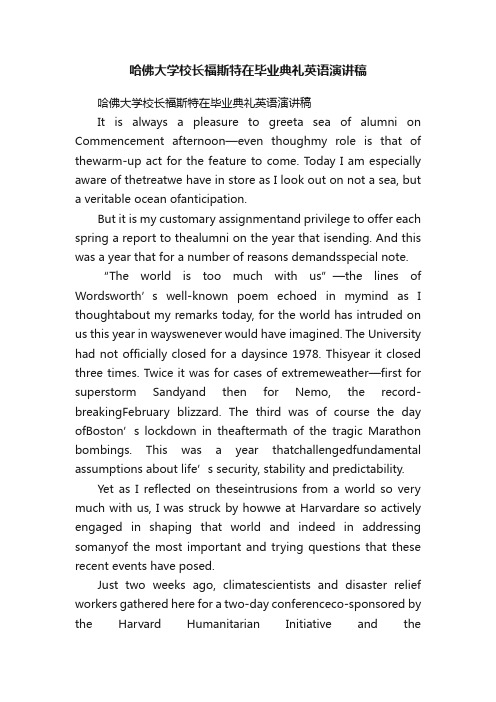
哈佛大学校长福斯特在毕业典礼英语演讲稿哈佛大学校长福斯特在毕业典礼英语演讲稿It is always a pleasure to greeta sea of alumni on Commencement afternoon—even thoughmy role is that of thewarm-up act for the feature to come. Today I am especially aware of thetreatwe have in store as I look out on not a sea, but a veritable ocean ofanticipation.But it is my customary assignmentand privilege to offer each spring a report to thealumni on the year that isending. And this was a year that for a number of reasons demandsspecial note.“The world is too much with us”—the lines of Wordsworth’s well-known poem echoed in mymind as I thoughtabout my remarks today, for the world has intruded on us this year in wayswenever would have imagined. The University had not officially closed for a daysince 1978. Thisyear it closed three times. Twice it was for cases of extremeweather—first for superstorm Sandyand then for Nemo, the record-breakingFebruary blizzard. The third was of course the day ofB oston’s lockdown in theaftermath of the tragic Marathon bombings. This was a year thatchallengedfundamental assumptions about life’s security, stability and predictability.Yet as I reflected on theseintrusions from a world so very much with us, I was struck by howwe at Harvardare so actively engaged in shaping that world and indeed in addressing somanyof the most important and trying questions that these recent events have posed.Just two weeks ago, climatescientists and disaster relief workers gathered here for a two-day conferenceco-sponsored by the Harvard Humanitarian Initiative and theHarvardUniversityCenter for the Environment. They came to explore the very issues presentedbySandy and Nemo and to consider how academic researchers and workers on theground cancollaborate more effectively.This gathering represents justone example of the wide range of activities across theUniversity dedicated toaddressing the challenges of climate change. How can we advance thesciencethat helps us understand climate change—and perhaps avert it? How can wedevisesolutions—from new technologies to principles of urban design—that mightmitigate it?How can we envision the public policies to manage and respond toit? Harvard is deeplyengaged with the broad issues of energy andenvironment—offering more than 250 courses inthis area, gathering 225 facultythrough our environment center and its programs, enrolling100 doctoralstudents from 7 Schools and many different disciplines in a graduateconsortiumdesigned to broaden their understanding of environmental issues. Our facultyarestudying atmospheric composition and working to develop renewable energysources; theyare seeking to manage rising oceans and to reimagine cities foran era of increasinglythreatening weather; they are helping to fashionenvironmental regulations and internationalclimate agreements.So the weather isn’t somethingthat simply happens at Harvard, even though it may haveseemed that way when wehad to close twice this year. It is a focus of study and of research, aswework to confront the implications of climate change and help shape nationalandinternational responses to its extremes.When Boston experienced thetragedy of the Marathon bombings last month, the city andsurroundingmunicipalitieswent into lockdown on April 19 to help ensure the capture oftheescaped suspect, and Harvard responded in extraordinary ways. Within ourowncommunity, students, faculty and staff went well beyond their ordinaryresponsibilities tosupport one another and keep the University operatingsmoothly and safely underunprecedented circumstances. But we also witnessedour colleagues’ magnificent efforts tomeet the needs of Boston and our other neighborsin the crisis. The Harvard Police worked withother law enforcement agencies,and several of our officers played a critical role in saving thelife of thetransit officer wounded in Watertown. Doctors, nurses and other staff, manyfrom ouraffiliated hospitals, performed a near-miracle in ensuring that everyinjured person who arrivedat a hospital survived. Years of disaster planningand emergency readiness enabled theseinstitutions to act in a stunninglycoordinated and effective manner. I am deeply proud of thecontributions madeby members of the Harvard community in the immediate aftermath of thebombings.But our broader and ongoingresponsibility as a university is to ask and address the largerquestions anysuch tragedy poses: to prepare for the next crisis and the one after that, evenaswe work to prevent them; to help us all understand the origins and themeaning of suchterrible events in human lives and societies. We do this workin the teaching and research towhich we devote ourselves every day.。
比尔·盖茨在哈佛大学毕业典礼上的演讲(中英文对照)[精选5篇]
![比尔·盖茨在哈佛大学毕业典礼上的演讲(中英文对照)[精选5篇]](https://img.taocdn.com/s3/m/bfeec3f05122aaea998fcc22bcd126fff7055ddb.png)
比尔·盖茨在哈佛大学毕业典礼上的演讲(中英文对照)[精选5篇]第一篇:比尔·盖茨在哈佛大学毕业典礼上的演讲(中英文对照) 比尔·盖茨和夫人梅琳达·盖茨在斯坦福大学2014年毕业典礼上的演讲。
整个演讲以“乐观”为主线,强调了他们对科技的乐观态度,以及对世界美好未来的乐观态度。
盖茨夫妇轮流讲述了自己的亲身经历和故事,告诉学生应该站在他人的立场上,感同身受那些处境不及自己的人,尽自己所能去帮助那些需要帮助的人,让全世界所有人类同胞都有一样的美好未来。
Stanford University.(斯坦福大学)BILL GATES: Congratulations, class of 2014!比尔·盖茨:2014届毕业生,祝贺你们顺利毕业(Cheers).(欢呼)Melinda and I are excited to be here.It would be a thrill for anyone to be invited to speak at a Stanford commencement, but it's especially gratifying for us.Stanford is rapidly becoming the favorite university for members of our family, and it's long been a favorite university for Microsoft and our foundation.我和梅琳达怀着激动的心情与你们欢聚在此共贺毕业。
能受邀到斯坦福大学学位授予典礼上做演讲是一件让人激动的事,对我们而言,这尤为荣幸。
斯坦福大学正日渐成为我们家庭成员最喜爱的大学。
而长久以来,斯坦福也是微软以及比尔与梅琳达基金会最喜爱的一所大学。
”Our formula has been to get the smartest, most creative people working on the most important problems.It turns out that a disproportionate number of those people are at Stanford.(Cheers).我们一直致力于让最聪颖有创造力的人攻克最为重要的问题。
哈佛大学校长德鲁·福斯特英语演讲稿:建立未来的意识和行动
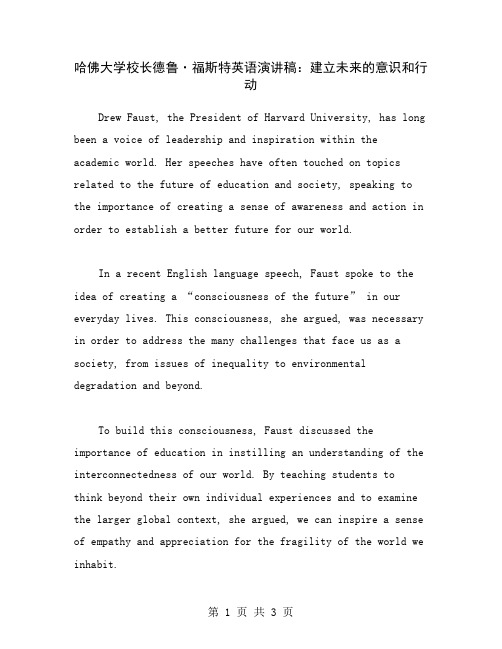
哈佛大学校长德鲁·福斯特英语演讲稿:建立未来的意识和行动Drew Faust, the President of Harvard University, has long been a voice of leadership and inspiration within the academic world. Her speeches have often touched on topics related to the future of education and society, speaking to the importance of creating a sense of awareness and action in order to establish a better future for our world.In a recent English language speech, Faust spoke to the idea of creating a “consciousness of the future” in our everyday lives. This consciousness, she argued, was necessary in order to address the many challenges that face us as a society, from issues of inequality to environmental degradation and beyond.To build this consciousness, Faust discussed the importance of education in instilling an understanding of the interconnectedness of our world. By teaching students tothink beyond their own individual experiences and to examine the larger global context, she argued, we can inspire a sense of empathy and appreciation for the fragility of the world we inhabit.Beyond education, Faust also encouraged individuals to take action in their own lives. She spoke to the importance of small, everyday choices, from deciding to recycle to making more sustainable choices as consumers. Through these small acts of commitment, she argued, we can collectively begin to shift the trajectory of our society towards a more positive future.Faust also spoke to the importance of collective action, highlighting the power of movements such as the recent global climate strikes as evidence of the potential for widespread mobilization. When individuals come together with a shared vision for the future, she argued, they can act as a powerful force for positive change.Finally, Faust emphasized the need for leadership in establishing a consciousness of the future. She spoke to the importance of public figures and those in positions of power to use their platforms to promote awareness and action, highlighting the role of Harvard as a leading institution in shaping a more sustainable and progressive future for our world.In closing, Faust encouraged her audience to embrace the challenge of creating a consciousness of the future, recognizing that the path towards a better world is a collective and ongoing journey. Through education, individual action, collective mobilization, and leadership, she argued, we can build a brighter and more sustainable future for generations to come.。
Faust毕业典礼致辞哈佛大学校长Drew

Faust 毕业典礼致辞哈佛大学校长Drew哈佛大学Drew Faust :最好的教育即培养精神习惯Faust 于Memorial Church 向身着方帽长袍的毕业生发表了一年一度的毕业班告别讲话。
一年一度的毕业仪式在毕业典礼之前举行,包括祈祷、唱诗及校长为毕业班进行的告别演讲。
牢记正是通艺教育为各位应对变革做好了准备,Faust 说。
“更新我们的承诺并重新规划人生的机会是一项仅供少数几代人拥有的特权。
而现时它不是一种可能,而是种必要。
”这一几乎与哈佛大学同样古老的仪式可以追溯到1642 年。
当年的举行的第一次仪式使哈佛的工作人员及神职人员有机会在更安格按照流程进行的毕业典礼之前向毕业生发表讲话。
这一仪式由基督教道德Plummer 讲席教授及MemorialChurch 蒲塞牧师Rev. Peter J. Gomes 主持,主要以儒学、伊斯兰教、印度教、犹太教及基督教读物为特色。
Faust 的讲话是仪式的中心亮点。
她称哈佛大学强调通艺教育正是为了这样的危机时刻设计的。
第一,不管今后学习、生活在何方,都要志存高远,做个对社会负责、对家庭负责、对自己负责的人。
我们所有的学生都要懂得,只要你们不懈地努力,美好的明天属于你们每一位同学。
我们一直坚持最好的教育即培养精神习惯,一种分析的精神、一种评判及探究的能力,这能使你们胜任于任何环境或者选择任何职业方向,” Faust 说。
“这一理念怎能比现在这一时刻更为适合?”Faust 号召毕业生勇往直前应对挑战,指出尽管我们不喜欢不确定性,但是不确定的时代为个人成长及职业生涯成长都提供了机会。
她引用了作家Joan Didion 的话将应对生活形容为“严苛与安逸、束缚与自由、理智及直觉充满魔力的交汇处。
”她也引用爵士音乐大师Charlie Parker 的话,掌控你的乐器、掌控音乐,之后忘情演奏。
Faust 指出,不确定性和应对对于要求准确性的领域如物理学和药学也是十分重要的。
比尔盖茨哈佛大学毕业典礼上演讲中英文本

比尔盖茨哈佛大学毕业典礼上演讲中英文本President Bok, former President Rudenstine, incoming President Faust, members of the Harvard Corporation and the Board of Overseers, members of the faculty, parents, and especially, the graduates 尊敬的Bok 校长,Rudenstine 前校长,即将上任的Faust 校长,哈佛集团的各位成员,监管理事会的各位理事,各位老师,各位家长,各位同学:Ive been waiting more than 30 years to say this: Dad, I always told you Id come back and get my degree.有一句话我等了三十年,现在终于可以说了:老爸,我总是跟你说,我会回来拿到我的学位的!I want to thank Harvard for this timely honor. Ill be changing my job next year and it will be nice to finally have a college degree on my resume.我要感谢哈佛大学在这个时候给我这个荣誉。
明年,我就要换工作了我终于可以在简历上写我有一个本科学位,这真是不错啊。
I applaud the graduates today for taking a much more direct route to your degrees. For my part, Im just happy that the Crimson has called me Harvards most successful dropout. I guess that makes me valedictorian of my own special class I did the best of everyone who failed.我为今天在座的各位同学感到高兴,你们拿到学位可比我简单多了。
哈佛大学校长Drew Faust在2012毕业典礼上的演讲

哈佛大学校长Drew Faust在2012毕业典礼上的演讲美国哈佛大学校长Drew Faust女士在2012毕业典礼上的演讲,同时Drew G. Faust也是哈佛375年历史上第一位女性校长,还是第一位非哈佛毕业生校长,杰出的历史学家,2001年从宾西法尼业大学到哈佛的Radcliffe学院任教。
这是她在2012年哈佛大学毕业典礼上的演讲英语文本。
With Commencem ent today, we close our year of commemorating Harvard’s 375th birthday. From an exuberant party for 18,000 in torrential rain and ankle-deep mud here in Tercentenary Theatre last fall to today’s invocation of John Harvard’s spirit still walking the Yard, w e have celebrated this special year and this institution’s singular and distinguished history. Founded by an act of the Great and General Court of the Massachusetts Bay Colony in 1636, Harvard was the first college in the English colonies and is the oldest in what has become the United States. Harvard was already 140 years old when the nation was founded. There are few institutions in this country or even the world that can claim such longevity.But what does such a claim mean? At a time when the buzzword o f “innovation” is everywhere, when the allure of the new drives business, politics and society, what do we intend by our celebration of endurance and of history? Why do we see history as an essential part of our identity? Why is Harvard’s past an invaluabl e resource as we decide how to shape the future?In a quite literal sense, history creates our identity – who we as Harvard actually are – and as a result who we aspire to be. We live in a community made up not just of the students, faculty and staff now here –or even the 300,000 Harvard alumni around the world. We are part of a community that extends across time as well as space. We acknowledge an indelible connection to those who have come before –predecessors both recent and remote, who remind us of what is possible for us by their demonstration of what was possible for them.Harvard’s history instills both expectations and responsibilities as it challenges us to inhabit this legacy. One cannot study philosophy here without sighting the ghosts of John Rawls, Willard Quine, Benjamin Peirce, Ralph Waldo Emerson, or William James. One cannot study law without thinking of the 18 Harvard Law School alumni who have served as Supreme Court justices, including the 6 currently on the bench – not to mention the graduate in the White House and the seven presidents with Harvard degrees who have preceded him. Those who appear on Harvard stages surely imagine themselves as Jack Lemmon or Natalie Portman or Stockard Channing, directed by the equivalents of Peter Sellars, Diane Paulus, or Mira Nair. Or perhaps our aspiring actors see themselves in John Lithgow and Tommy Lee Jones, who returned together for Arts First weekend earlier this month to reminisce about their thespian adventures in Cambridge. And those seeking to change the world through technology are sure to reflect on Zuckerberg, Ballmer, and Gates. In these domains and so many others, we have the privilege of living alongside a remarkable heritage of predecessors.We have certainly not come to work and study here in Cambridge and Boston because of the weather – though this past winter suggests climate change may be altering that. We are drawn here because others before us have set a standard that extends across centuries in its power and its appeal. We think of ourselves in their company; we seek to be worthy of that company, and to share our days with others similarly motivated and inspired. We want to contribute as they have contributed in every imaginable field. We want to know – to understand – societies, governments, eras, organizations, galaxies, works of art and literature, structures, circuits, diseases, cells. We want to make our lives matter. We want to improve the human condition and build a better world.We want Harvard to ask that of us, to expect that of us and to equip us to accomplish it.History shapes our institutional ideals as well as our individual ambitions. Having a history diminishes the grip of the myopic present, helping us to see beyond its bounds, to transcend the immediate in search of the enduring. It challenges us to place our aspirations and responsibilities within the broadest context of understanding.We expect the future to be as long as the past; we must act in ways that are not just about tomorrow – but about decades and even centuries to come. This means that we teach our students with the intention of shaping the whole of their lives as well as readying them for what happens as soon as they leave our gates. This means that in the sciences – and beyond – we support research that is driven by curiosity, by the sheer desire to understand – at the same time that we pursue discoveries that have immediate measurable impact. And it means that we support fields of study –of languages, literatures, cultures –that are intended to locate us within traditions of reflection about the larger purposes of human existence, enabling us to look beyond ourselves and our own experience, to ask where we are going – not just how we get there.Even in our professional Schools, designed to educate students for specific vocations, we seek to instill the perspective that derives from the critical eye and the questioning mind; we charge our students to think about lasting value, not just quarterly returns.These commitments shape our institutional identity – our discussions and decisions about what a university is and must be. As both higher education and the world have been transformed, Harvard has not just weathered the past 375 years. It has changed and flourished – from its origins as a small, local college designed to produce educated ministers and citizens, to its emergence as a research university in the late 19th century, to its transformation into a national institution, and its development after World War II as an engine of scientific discovery and economic growth, as well as a force for significantly broadening social opportunity.We are now in another moment of dramatic shift in higher education: Globalization and technology are prominent among the forces that challenge us once again to examine how we do our work and how we define our aims. This year alone we have launched a new University-wide initiative to think in fresh ways about our methods of learning and teaching, a new University-wide Innovation Lab to help our students bring their ideas to life, and edX, a new partnership with MIT to embrace the promise of online learning for our students while sharing our knowledge more widely with the world.As we reimagine ourselves for the 21st century, we recognize that history teaches us not just about continuity –what is important because it is enduring. History also teaches us about change. Harvard has survived and thrived by considering over and over again how its timeless and unwavering dedication to knowledge and truth must be adapted to the demands of each new age. History encourages us to see contingency and opportunity by offering us the ability to imagine a different world.Think of how Harvard changed as we came to recognize that our commitment to fulfilling human potential required us to open our gates more broadly. The continuity of our deepest values led us to the transformation of our practices – and of the characteristics of the students, faculty and staff who inhabit and embody Harvard. What was once unimaginable came to seem necessary and even inevitable as we extended the circle of inclusion and belonging to welcome minorities and women, and in recent years to so significantly enhance support for students of limited financial means. Our history provides “a compass to steer by” –to borrow a phrase from Massachusetts BayGovernor John Winthrop. It fills us with confidence in our purposes and in our ability to surmount the risks of uncharted seas. With the strength of our past, we welcome these unknowns and the opportunities they offer as we reimagine Harvard for its next 375 years. For nearly four centuries now, Harvard has been inventing the future. History is where the future begins.Thank you very much.。
奥普拉哈佛大学毕业演讲全文含译文

Oh my goodness! I‟m at Harvard! Wow! To President Faust, my fellow honorans, Carl [Muller] that was so beautiful, thank you so much, and James Rothenberg, Stephanie Wilson, Harvard faculty, with a special bow to my friend Dr. Henry Lewis Gates. All of you alumni, with a special bow to the Class of ‟88, your hundred fifteen million dollars. And to you, members of the Harvard class of 2013! Hello!我的天啊!我在哈...佛!真的!尊敬的Faust校长、和我一起获得荣誉学位的各位,Carl(注:Carl Muller哈佛校友会主席),真是太棒了,谢谢你们!还有James Rothenberg, Stephanie Wilson和哈佛的教职工们,特别感谢我的朋友Henry Lewis Gates博士(注:美国知名黑人教授)!感谢所有的哈佛校友,特别要感谢88届的毕业生,你们为哈佛捐出一亿一千五百万美元(注:哈佛历史上最多的一次同一班次校友捐款)。
所有2013届的各位毕业生们!大家好!I thank you for allowing me to be a part of the conclusion of this chapter of your lives and the commencement of your next chapter. To say that I‟m honored doesn‟t even begin to quantify the depth of gratitude that really accompanies an honorary doctorate from Harvard. Not too many little girls from rural Mississippi have made it all the way here to Cambridge. And I can tell you that I consider today as I sat on the stage this morning getting teary for you all and then teary for myself, I consider today a defining milestone in a very long and a blessed journey. My one hope today is that I can be a source of some inspiration. I‟m going to address my remarks to anybody who has ever felt inferior or felt disadvantaged, felt screwed by life, this is a speech for the Quad.感谢你们让我成为你们人生这一篇章的结束与下一篇章开始的纽带。
哈佛校长Drew G在毕业典礼上的演讲

哈佛校长Drew G. Fast是哈佛历史上第一位女校长,第一位非哈佛毕业的校长,杰出的历史学家。
根据这所古老学府的传统,我该慷慨激昂地传授你们一些终生受用的智慧。
而现在我站在讲坛上,这身鬼打扮也许已经吓坏了那些声名显赫的祖先们。
可我既然来了,你们也都在,那么我们还是来聊聊真理吧。
当我在克克兰学社吃午饭,在莱弗里特吃晚饭时,当我在办公时间接见同学时,甚至当我在国外偶遇刚毕业不久的学生时,同学们都会问我一个问题:为什么我们哈佛的学生中,有那么多人会投身到金融,咨询和电子银行领域中去?比起回答你们的问题,我更有兴趣知道你们为什么会这么问,为什么这个问题会困扰那么多人?我想,你们之所以会忧心忡忡,是因为你们不想仅仅取得传统意义上的成功,还想让人生过得有意义,可你们不知道怎么把这两个目标结合起来。
你们不确定,是不是在一家大名鼎鼎的名牌企业中拥有一份起薪丰厚,前途光明的工作,就能得到精神上的满足。
其实你们一直在问的都是一些最基本的问题:关于价值,关于怎样去调和有可能存在的竞争的事物之间的关系,关于鱼和熊掌不可兼得的领悟。
每一个决定都意味着取舍,拥抱一种可能性的同时也得放弃另一种可能性。
你们的问题就是你们对于未选择的路的失落感。
我想,你们焦虑的第二个原因是你们想过得幸福。
你们扎堆选修《乐观心理学》和《幸福学》,就是想从中找到一点秘诀。
可怎样才能找到幸福呢?我给你们一个鼓舞人心的答案:成长。
每当听到你们谈论自己面临的选择时,我听得出来,你们非常担忧处理不好成功与幸福的关系,确切地说,怎样去定义成功才能让它带来或者包含真正的幸福,而不只是金钱和名望。
你们担心报酬高的工作不一定最有意义、最令人满足。
答案是:只有试过了你才知道。
如果你不试着去做自己喜欢做的事,如果你不去追求你认为最有意义的东西,你会后悔的。
人生路漫漫,选择第二志愿的机会多的是,但不要把它作为首选。
我把这个叫做职业选择中的停车位理论:不要因为怕没有停车位就把车停在距离目的地20个街区远的地方。
哈佛毕业典礼演讲(中英文对照)
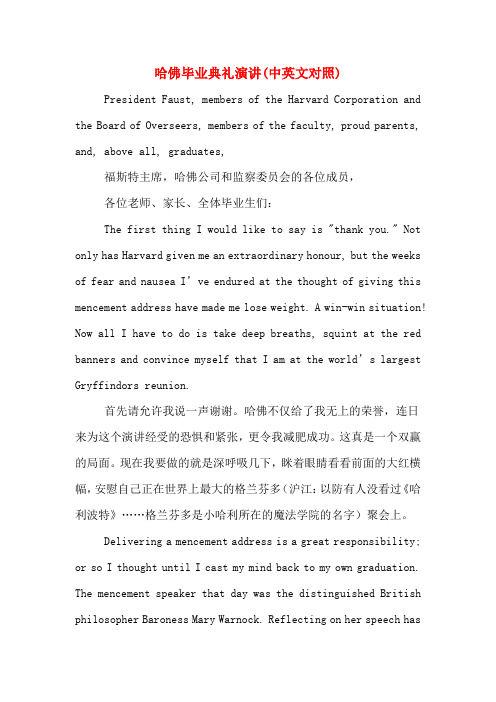
哈佛毕业典礼演讲(中英文对照)President Faust, members of the Harvard Corporation and the Board of Overseers, members of the faculty, proud parents, and, above all, graduates,福斯特主席,哈佛公司和监察委员会的各位成员,各位老师、家长、全体毕业生们:The first thing I would like to say is "thank you." Not only has Harvard given me an extraordinary honour, but the weeks of fear and nausea I’ve endured at the thought of giving this mencement address have made me lose weight. A win-win situation! Now all I have to do is take deep breaths, squint at the red banners and convince myself that I am at the world’s largest Gryffindors reunion.首先请允许我说一声谢谢。
哈佛不仅给了我无上的荣誉,连日来为这个演讲经受的恐惧和紧张,更令我减肥成功。
这真是一个双赢的局面。
现在我要做的就是深呼吸几下,眯着眼睛看看前面的大红横幅,安慰自己正在世界上最大的格兰芬多(沪江:以防有人没看过《哈利波特》……格兰芬多是小哈利所在的魔法学院的名字)聚会上。
Delivering a mencement address is a great responsibility; or so I thought until I cast my mind back to my own graduation. The mencement speaker that day was the distinguished British philosopher Baroness Mary Warnock. Reflecting on her speech hashelped me enormously in writing this one, because it turns out that I cant remember a single word she said. This liberating discovery enables me to proceed without any fear that I might inadvertently influence you to abandon promising careers in business, law or politics for the giddy delights of being a gay wizard.发表毕业演说是一个巨大的责任,至少在我回忆自己当年的毕业典礼前是这么认为的。
哈佛大学校长德鲁-福斯特在哈佛毕业典礼上的演讲
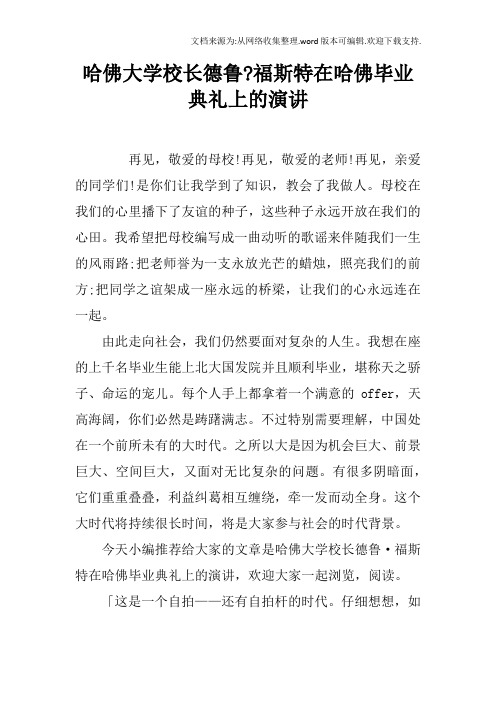
哈佛大学校长德鲁?福斯特在哈佛毕业典礼上的演讲再见,敬爱的母校!再见,敬爱的老师!再见,亲爱的同学们!是你们让我学到了知识,教会了我做人。
母校在我们的心里播下了友谊的种子,这些种子永远开放在我们的心田。
我希望把母校编写成一曲动听的歌谣来伴随我们一生的风雨路;把老师誉为一支永放光芒的蜡烛,照亮我们的前方;把同学之谊架成一座永远的桥梁,让我们的心永远连在一起。
由此走向社会,我们仍然要面对复杂的人生。
我想在座的上千名毕业生能上北大国发院并且顺利毕业,堪称天之骄子、命运的宠儿。
每个人手上都拿着一个满意的offer,天高海阔,你们必然是踌躇满志。
不过特别需要理解,中国处在一个前所未有的大时代。
之所以大是因为机会巨大、前景巨大、空间巨大,又面对无比复杂的问题。
有很多阴暗面,它们重重叠叠,利益纠葛相互缠绕,牵一发而动全身。
这个大时代将持续很长时间,将是大家参与社会的时代背景。
今天小编推荐给大家的文章是哈佛大学校长德鲁·福斯特在哈佛毕业典礼上的演讲,欢迎大家一起浏览,阅读。
「这是一个自拍——还有自拍杆的时代。
仔细想想,如果社会里的每个人都开始过上整天自拍的生活,这会是怎样一个社会呢?对于我来说,那也许是“利己主义”最真实的写照了。
我们无休止地关注我们自己、我们的形象、我们得到的“赞”,不停地进行“自我放大”。
我也知道,你们这几年也有许多美好的记忆:信息院里,有你们又怕又爱、面冷心慈、批评起人来连男生也会哭的“吴奶奶”——吴同茂老师;湘雅医学院里,有熟悉临床八年制学生各种详细信息、生病也要为同学们办好毕业庆祝晚会的辅导员——丁红珊“老大姐”;铁道校区学生3舍里,有同学们遇到困难就愿意和他聊一聊的宿管员李发强师傅;升华公寓25栋里,有被同学们称为知心朋友、贴心哥哥的85后楼管“杨帅哥”;机电院里,有傲立风雨中,直言“我的课讲得好”,“我不服”的汤老师,等等。
这些普通的老师和职工一直关心着你们、爱着你们!最后,我们在抓好期末复习的同时,每一位同学应一如既往地遵守好学校的课堂常规,做到上课不说话,不做小动作。
JK罗琳哈佛大学毕业典礼演讲稿

J.Kxx20xx年哈佛大学毕业典礼演讲——《哈利.波特》作者J.K罗琳JK罗琳哈佛大学演讲(中英文)President Faust, members of the Harvard Corporation and the Board of Overseers,members of the faculty, proud parents, and, above all, graduates,福斯特主席,哈佛公司和监察委员会的各位成员,各位老师、家长、全体毕业生们:发表毕业演说是一个巨大的责任,至少在我回忆自己当年的毕业典礼前是这么认为的。
那天做演讲的是英国著名的哲学家Baroness Mary Warnock,对她演讲的回忆,对我写今天的演讲稿,产生了极大的帮助,因为我不记得她说过的任何一句话了。
这个发现让我释然,让我不再担心我可能会无意中影响你放弃在商业,法律或政治上的大好前途,转而醉心于成为一个快乐的魔法师(gay 有快乐和同性恋的意思)。
你们看,如果在若干年后你们还记得“快乐的魔法师”这个笑话,那就证明我已经超越了Baroness Mary Warnock。
建立可实现的目标——这是提高自我的第一步。
Actually, I have wracked my mind and heart for what I ought to say to you today. I have asked myself what I wish I had known at my own graduation, and what important lessons I have learned in the 21 years that has expired between that day and this.实际上,我为今天应该和大家谈些什么绞尽了脑汁。
我问自己什么是我希望早在毕业典礼上就该了解的,而从那时起到现在的21年间,我又得到了什么重要的启示。
- 1、下载文档前请自行甄别文档内容的完整性,平台不提供额外的编辑、内容补充、找答案等附加服务。
- 2、"仅部分预览"的文档,不可在线预览部分如存在完整性等问题,可反馈申请退款(可完整预览的文档不适用该条件!)。
- 3、如文档侵犯您的权益,请联系客服反馈,我们会尽快为您处理(人工客服工作时间:9:00-18:30)。
哈佛大学校长Drew Faust 在2012毕业典礼上的演讲(英语文本)美国哈佛大学校长Drew Faust女士在2012毕业典礼上的演讲,同时Drew G. Faust也是哈佛375年历史上第一位女性校长,还是第一位非哈佛毕业生校长,杰出的历史学家,2001年从宾西法尼业大学到哈佛的Radcliffe学院任教。
With Commencement today, we close our year of commemorating Harvard’s 375th birthday. From an exuberant party for 18,000 in torrential rain and ankle-deep mud here in Tercentenary Theatre last fall to today’s invocation of John Harvard’s spirit still walking the Yard, we have celebrated t his special year and this institution’s singular and distinguished history. Founded by an act of the Great and General Court of the Massachusetts Bay Colony in 1636, Harvard was the first college in the English colonies and is the oldest in what has become the United States. Harvard was already 140 years old when the nation was founded. There are few institutions in this country or even the world that can claim such longevity.But what does such a claim mean? At a time when the buzzword of “innovation” is e verywhere, when the allure of thenew drives business, politics and society, what do we intend by our celebration of endurance and of history? Why do we see history as an essential part of our identity? Why is Harvard’s past an invaluable resource as we decide how to shape the future?In a quite literal sense, history creates our identity – who we as Harvard actually are – and as a result who we aspire to be. We live in a community made up not just of the students, faculty and staff now here –or even the 300,000 Harvard alumni around the world. We are part of a community that extends across time as well as space. We acknowledge an indelible connection to those who have come before –predecessors both recent and remote, who remind us of what is possible for us by their demonstration of what was possible for them. Harvard’s history instills both expectations and responsibilities as it challenges us to inhabit this legacy. One cannot study philosophy here without sighting the ghosts of John Rawls, Willard Quine, Benjamin Peirce, Ralph Waldo Emerson, or William James. One cannot study law without thinking of the 18 Harvard Law School alumni who have served as Supreme Court justices, including the 6 currently on the bench –not to mention the graduate in the White House and the sevenpresidents with Harvard degrees who have preceded him. Those who appear on Harvard stages surely imagine themselves as Jack Lemmon or Natalie Portman or Stockard Channing, directed by the equivalents of Peter Sellars, Diane Paulus, or Mira Nair. Or perhaps our aspiring actors see themselves in John Lithgow and Tommy Lee Jones, who returned together for Arts First weekend earlier this month to reminisce about their thespian adventures in Cambridge. And those seeking to change the world through technology are sure to reflect on Zuckerberg, Ballmer, and Gates. In these domains and so many others, we have the privilege of living alongside a remarkable heritage of predecessors.We have certainly not come to work and study here in Cambridge and Boston because of the weather –though this past winter suggests climate change may be altering that. We are drawn here because others before us have set a standard that extends across centuries in its power and its appeal. We think of ourselves in their company; we seek to be worthy of that company, and to share our days with others similarly motivated and inspired. We want to contribute as they have contributed in every imaginable field. We want to know –to understand –societies, governments, eras, organizations,galaxies, works of art and literature, structures, circuits, diseases, cells. We want to make our lives matter. We want to improve the human condition and build a better world. We want Harvard to ask that of us, to expect that of us and to equip us to accomplish it.History shapes our institutional ideals as well as our individual ambitions. Having a history diminishes the grip of the myopic present, helping us to see beyond its bounds, to transcend the immediate in search of the enduring. It challenges us to place our aspirations and responsibilities within the broadest context of understanding.We expect the future to be as long as the past; we must act in ways that are not just about tomorrow – but about decades and even centuries to come. This means that we teach our students with the intention of shaping the whole of their lives as well as readying them for what happens as soon as they leave our gates. This means that in the sciences –and beyond –we support research that is driven by curiosity, by the sheer desire to understand –at the same time that we pursue discoveries that have immediate measurable impact. And it means that we support fields of study –of languages, literatures, cultures –that are intended to locate us within traditions of reflectionabout the larger purposes of human existence, enabling us to look beyond ourselves and our own experience, to ask where we are going – not just how we get there.Even in our professional Schools, designed to educate students for specific vocations, we seek to instill the perspective that derives from the critical eye and the questioning mind; we charge our students to think about lasting value, not just quarterly returns.These commitments shape our institutional identity –our discussions and decisions about what a university is and must be. As both higher education and the world have been transformed, Harvard has not just weathered the past 375 years. It has changed and flourished – from its origins as a small, local college designed to produce educated ministers and citizens, to its emergence as a research university in the late 19th century, to its transformation into a national institution, and its development after World War II as an engine of scientific discovery and economic growth, as well as a force for significantly broadening social opportunity.We are now in another moment of dramatic shift in higher education: Globalization and technology are prominent among the forces that challenge us once again to examine how we doour work and how we define our aims. This year alone we have launched a new University-wide initiative to think in fresh ways about our methods of learning and teaching, a new University-wide Innovation Lab to help our students bring their ideas to life, and edX, a new partnership with MIT to embrace the promise of online learning for our students while sharing our knowledge more widely with the world.As we reimagine ourselves for the 21st century, we recognize that history teaches us not just about continuity –what is important because it is enduring. History also teaches us about change. Harvard has survived and thrived by considering over and over again how its timeless and unwavering dedication to knowledge and truth must be adapted to the demands of each new age. History encourages us to see contingency and opportunity by offering us the ability to imagine a different world.Think of how Harvard changed as we came to recognize that our commitment to fulfilling human potential required us to open our gates more broadly. The continuity of our deepest values led us to the transformation of our practices – and of the characteristics of the students, faculty and staff who inhabit and embody Harvard. What was once unimaginable came toseem necessary and even inevitable as we extended the circle of inclusion and belonging to welcome minorities and women, and in recent years to so significantly enhance support for students of limited financial means.Our history provides “a compass to steer by” –to borrow a phrase from Massachusetts Bay Governor John Winthrop. It fills us with confidence in our purposes and in our ability to surmount the risks of uncharted seas. With the strength of our past, we welcome these unknowns and the opportunities they offer as we reimagine Harvard for its next 375 years. For nearly four centuries now, Harvard has been inventing the future. History is where the future begins。
